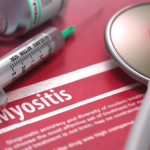The new myositis classification guidelines include various clinical characteristics, muscle biopsy findings and autoantibody results. The criteria utilize a scoring system to aid myositis classification. Dr. Aggarwal notes that having myositis autoantibodies gives half the points needed to achieve diagnosis of IIM under the new classification criteria.
The new criteria include only the autoantibody Jo-1, not other MSAs. Dr. Aggarwal explains that much more information was available on Jo-1 than for other autoantibodies when these classification criteria were being developed. “That’s why you will see Jo-1 as a representative of myositis autoantibodies in the new classification criteria, but not other autoantibodies.” He notes, “In the future, we hope that Jo-1 will be replaced by any myositis-specific antibody in the classification criteria.”
Ordering MSA & MAA Tests
Although access may be limited in certain clinical settings, tests for MSAs and MAAs are becoming more readily available. Quest Diagnostics provides an MSA autoantibody panel with eight myositis autoantibodies. Dr. Aggarwal also recommends myositis autoantibody panels available through RDL Reference Laboratory, which provide a more extensive selection of autoantibodies. RDL also provides additional myositis tests, which are not included as part of its standard myositis panels. Additionally, some of the most recently discovered autoantibodies may be available only through research centers.
Dr. Aggarwal advises his colleagues to order one of these comprehensive myositis panels if they suspect myositis, even though these panels do not test all MSAs and MAAs. If these tests come back negative, additional autoantibody testing may be warranted if a clinician suspects an autoantibody based on clinical symptoms.
For example, these panels don’t usually include the anti-HMGCR antibody, which is seen in patients who have been exposed to statins and have developed severe muscle weakness. “If you have that kind of phenotype, which is not getting better even after stopping a statin, there may be value in ordering the anti-HMGCR antibody [test] specifically,” says Dr. Aggarwal. He adds, “As another example, if you have a patient with severe cutaneous rashes with ulceration and palmar rash and ischemic digits, that may be another reason to order another specific anti-MDA5 antibody [test].”
The extended myositis autoantibody panels are beginning to enter standard practice, but many centers do not yet use them routinely. One recent retrospective study looked at the outcomes of 22 patients who had been ordered such a panel. The panel had coverage for 23 autoantibodies. It was diagnostic in 27% of patients who had not received definitive diagnosis through other means. It also helped two patients avoid an invasive muscle biopsy procedure. Because of the results, clinicians initiated increased cancer surveillance in a patient with an anti-TIF1-γ autoantibody, and two patients with antisynthetase syndrome received further lung evaluation via high-resolution CT and pulmonary function tests.16
Future Directions
“If you look at the history of myositis-specific autoantibodies, every two to four years, we are able to discover an autoantibody that was not previously defined. Therefore, I am pretty sure we are missing several


